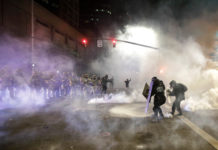Another long week in the all-stick, no-carrot revolution
Last Friday, over 500 students and lecturers signed a letter denouncing Harvard professor Steven Pinker. Citing five tweets and one line from a book, the signatories demanded Pinker be repudiated by the Linguistics Society of America for a history of “speaking over genuine grievances” at “the exact moment when Black and Brown people are mobilizing against systemic racism.”
The charges were beyond obscure. The effort to find traces of racism in Pinker’s massive bibliography of public statements recalled the way excited Christians periodically discover the face of Jesus in tree stumps or wall mold.
Pinker for instance is accused of having tweeted “Police kill too many people, black and white” (an “all lives matter” trope, signatories cried!), of using the phrase “urban crime” (a dog whistle!), and of calling it “statistically obtuse” to suggest the incel murderer of six women at UCSB was not acting as part of a sexist pattern.
That last episode particularly enraged signatories, as evidence of “downplaying the actual murder of six women.” Unfortunately, none of the accusing lecturers and PhD candidates, who presumably have done research before, noticed the actual spree killing to which Pinker referred involved two women and four men, not six women. But who’s counting? “Regardless of the identities of his victims,” the letter-writers noted in a bitter correction, “the murderer was driven by misogyny.”
To back up a charge of “downplaying actual violence,” the signatories pointed to a description of subway shooter Bernhard Goetz as a “mild-mannered engineer” in Pinker’s book The Better Angels of Our Nature.
This passage, about the ways American culture shifted in response to a rise in the violent crime rate, has to be quoted at length to show the absurdity:
The flood of violence from the 1960s through the 1980s reshaped American culture… Mugger jokes became a staple of comedians… New Yorkers imprisoned themselves in their apartments with batteries of latches and deadbolts… Books, movies and television series used intractable urban violence as their backdrop, including Little Murders, Taxi Driver, The Warriors, Escape from New York, Fort Apache the Bronx, Hill Street Blues, and Bonfire of the Vanities. Women enrolled in self-defense courses to learn how to walk with a defiant gait, to use their keys, pencils, and spike heels as weapons, and to execute karate chops or jujitsu throws to overpower an attacker, role-played by a volunteer in a Michelin-man-tire suit. Red-bereted Guardian Angels patrolled the parks and the mass transit system, and in 1984 Bernhard Goetz, a mild-mannered engineer, became a folk hero for shooting four young muggers in a New York subway car. A fear of crime helped elect decades of conservative politicians…
Pinker wasn’t litigating the justice of the Goetz incident. He was making an offhand description as part of a huge list detailing what he called the “overblown” reactions of a city gripped by fear and paranoia. If he had written in language closer to what the letter-writers would have found acceptable, e.g. “a rage-filled neo-Nazi named Bernhard Goetz became a folk hero after shooting four Black youths who asked him for five dollars” (signatories had a problem with the word “mugger” as well), it would have strengthened rather than changed Pinker’s rhetorical point: that New Yorkers, to at least some degree irrationally, were afraid of crime during a twenty-year period of rising crime rates. This letter was written by linguistics experts, and they don’t know how to read. It’s incredible.
Matt Taibbi – Reporting by Matt Taibbi – July 10, 2020.




